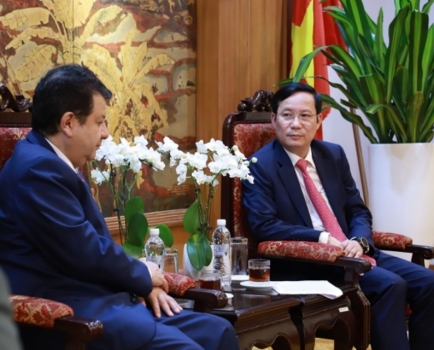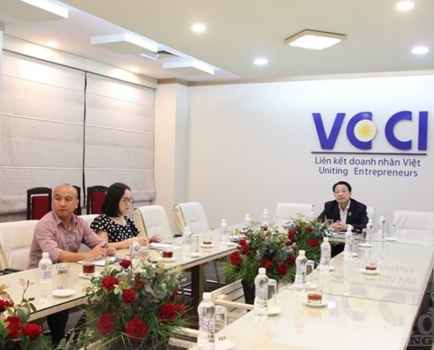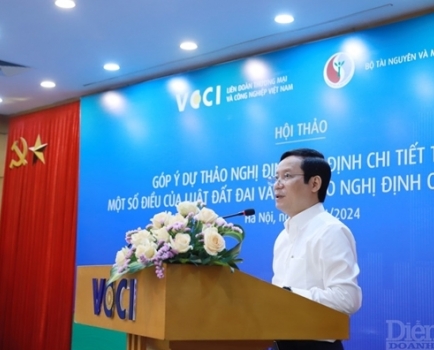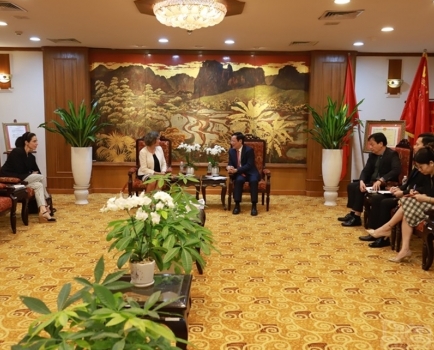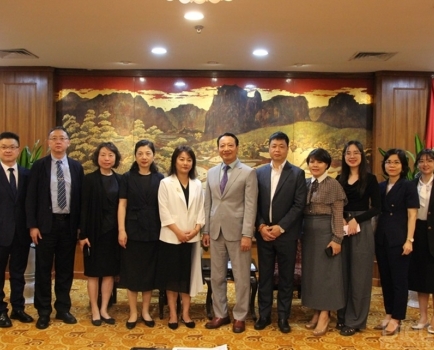Seeking Solutions to Advance Sustainable Development in Industrial Parks
Wed, 03 Apr 2024 22:18:00 | Print | Email Share:
“The establishment and growth of industrial parks (IPs) holds paramount significance in Vietnam’s socioeconomic landscape. The pursuit of sustainable development for these IPs stands as an important contribution toward fulfilling the country’s commitments to achieving net-zero emissions by 2050. This endeavor aligns with the National Strategy on Green Growth for the 2021-2030 period with a vision 2050, while also harmonizing with other important policy frameworks in Vietnam.”

VCCI Vice President Nguyen Quang Vinh addresses the forum on the sustainable development of Vietnam’s industrial parks
This statement was made by Mr. Nguyen Quang Vinh, Vice President of the Vietnam Chamber of Commerce and Industry (VCCI) at the Forum on Promoting Sustainable Development of Vietnam Industrial Parks. The forum, recently convened in Hanoi, was a collaborative effort between Business Forum Magazine and relevant agencies.
IPs have low EESG ratio
Vietnam currently has 418 IPs (including 371 IPs outside economic zones, 39 IPs in coastal economic zones and eight IPs in border gate economic zones) with a total land area of 129,900 hectares, including 89,200 hectares of rentable industrial land, said Vinh.
To date, 298 IPs have been put into operation with a total natural land area of 92,200 hectares, consisting of 63,100 hectares of rentable industrial land and 120 IPs are under construction with a total natural land area of about 37,500 hectares, comprised of 26,100 hectares of leasable land area. IPs have leased 51,300 ha of land, reaching the occupancy rate of about 57.5%. The rate in operational IPs is 72.5%. Among 298 IPs in operation, 272 IPs have operated centralized wastewater treatment plants that meet environmental standards (about 91.3%), fulfilling the target assigned by the National Assembly.
Tenants in IPs contribute about 50% of the country's total export turnover and help shift Vietnam's trade balance from deficit to balance and then to surplus, thus making significant contributions to the budget income growth. Industrial parks and economic zones have played an important role in business development, economic restructuring, industrial production growth and participation in global production and supply chains.
He said that, in 2022, The Vietnam Business Council for Sustainable Development (VBCSD-VCCI) and the Sustainable Trade Initiative in Vietnam (IDH Vietnam) jointly conducted an extensive research survey to assess the current status of 118 IPs across the country, employing the comprehensive economic, environmental, social, and governance (EESG) framework. the adoption of EESG development policies remains suboptimal. Specifically: Only 39% of IPs have risk management policies in place to ensure compliance with environmental regulations; 21% have risk management policies to ensure social compliance; 10% actively promote circular economy initiatives.13% have policies related to digital transformation. Despite growing interest in sustainability, awareness of sustainable IPs remains deficient: 50% of IPs lack a clear understanding of the concept of sustainable IPs; 30% possess limited knowledge of eco-IPs; 20% comprehensively grasp the need for balanced development across the four EESG pillars. Only 22% of IPs hold international management system certificates. 77% of IPs lack enterprise-level audit information pertaining to financial, social, and environmental aspects.
“Survey results have illuminated certain ‘bottlenecks’ within the realms of perception, policymaking, and governance concerning sustainable IPs. These findings serve as valuable indicators for policy recommendations and actionable steps aimed at advancing the establishment and efficient operation of sustainable IPs across Vietnam,” he added.
Efforts to develop new eco-green IP models
Ms. Vuong Thi Minh Hieu, Deputy Director of the Economic Zones Management Department, the Ministry of Planning and Investment, said that the ministry has made great efforts to develop new IP models toward green growth and sustainable development and has institutionalized these models in legal documents. The room for developing green industrial parks and sustainable industrial parks is huge.
In addition, the Government stipulates an economic zone model with many functions including industrial parks. Therefore, the synchronous and green development of industrial parks and economic zones will make positive and significant contributions to energy transformation and green transformation efforts that the Vietnamese Government pledged.
According to data from the Ministry of Industry and Trade, as of August 2023, Vietnam signed 16 FTAs and had three others under negotiation, she said. In these FTAs, the requirements for industry chain, value chain and clean, green production stages are very important as they help Vietnamese businesses make inroads into demanding markets. At the same time, the goal of sustainable industrial development was also included in the United Nations' commitments on sustainable development.
Similarly, the National Strategy on Green Growth for the 2021-2030 period as well as the Government's commitments at COP26 place urgent requirements for the industrial production sector to achieve green, sustainable growth.
According to this trend, the traditional IP model will be changed and developed sustainably to approach international requirements. In principle, developing sustainable IPs starts from the industrial ecosystem and the shift from linear economy to circular economy. In particular, the industrial ecosystem is developed like a natural ecosystem where outputs of one output production process can be the inputs of another production process. Similarly, by-products or waste products of one production process are also useful input materials for another one.
Thus, approaches to sustainable development, approaches to resource efficiency, cleaner production and industrial symbiosis have been devised, Hieu noted. First of all, at the corporate level, transformation will focus on resource efficiency and cleaner production solutions, low-carbon technology solutions, chemical use or renewable energy use.
“We will aim to connect industrial parks with surrounding communities and focus on sustainable city and urban development. Emphasis will be placed on good waste management and reuse as well as enhancing the social responsibility of the business community and the industrial manufacturer community,” she noted.
Benefits of eco-IPs and sustainable IPs are huge, enabling manufacturers to work together to adopt greener and cleaner solutions, save costs and optimize production activities. Besides, they also increase their environmental and social responsibility to the surrounding community, thereby improving the image of the business in the market. In particular, the sustainable development model also benefits surrounding communities by reducing pollution, increasing the quality of life for the community, reducing toxic chemicals in the environment and reducing greenhouse gas emissions.
Many regulatory bottlenecks Dr. Nguyen Quang Tuyen, Hanoi Law University Many legal bottlenecks are hindering the development of IPs and EZs in Vietnam. First, institutions and policies on IPs and EZs are not stable, unified and consistent and no breakthrough solutions for promoting the role and contribution of IPs and EZs in socioeconomic development have been in place. In particular, the legality of framework regulations for IPs and EZs is not high. The legal framework on operations of IPs and EZs has not had any fundamental changes, only defined to by-law documents. Second, the quality and efficiency of IP and EZ development planning have not met the requirements. The formation of a master plan for IP and EZ development needs long-term, holistic vision, placed in correlation with other economic sectors, with regional development and with society. Third, the form of IP and EZ development is slowly being reformed. Regulations on IP and EZ management are different from specialized laws. At the same time, there are still a lot of overlaps among legal provisions on state management of IPs and EZs. Fourth, the quality and effect of the attracted investment capital into IPs and EZs have not met requirements for in-depth development. The connection and cooperation in IPs and EZs; among IPs and EZs and between IPs and EZs with outside areas are still limited. Fifth, economic, environmental and social sustainability and balance in IP and EZ development has been raised but outcomes are different and uneven from locality to locality. Some localities have not effectively achieved social and environmental sustainability of IPs and EZs. Sixth, land use and management is also considered one of the obstacles to the IP and EZ development in Vietnam. In fact, land use planning has not been placed as the foundation for all other planning contents but still based on specific sectoral plannings (like general construction planning, functional zoning planning, detailed construction planning). Seventh, the organization of lead agencies of State apparatus for IPs and EZs at the central and local levels is slowly being consolidated and upgraded to meet requirements and tasks.
Institutions and policies on IPs and EZs need to be built at a higher threshold Mr. Le Huu Phuc, Deputy Director of Quang Ninh Economic Zones Authority Quang Ninh province currently has nine industrial parks which largely attract FDI projects. In practice, FDI attraction into economic zones (EZs) remains low due to various barriers, especially on legal aspects. Institutions and policies on IPs and EZs need to be built at a higher threshold because they are currently only at the Decree level. There is a need to introduce a law on IPs and EZs to create a full legal corridor. The entire planning process of IPs and EZs is currently defined across specialized laws, causing many difficulties for businesses. The new Land Law even lags behind regulations on IPs and EZs as the former only has general provisions on land management, as defined for other areas. There are almost no mechanisms for land re-allocation and no preferential policies on land for EZs. Besides, regarding specific policies and mechanisms, Quang Ninh has thoroughly researched specific policies for EZs but the process is still not completed. Therefore, we need to research policies and mechanisms to provide more development motivations for IPs and EZs, especially special economic zones (SEZs). Budget resources for infrastructure investment are limited. Hence, truly effective policies are needed to make a desirable change.
Many unclear regulations Ms. Tran Thi To Loan, Deputy General Director of Sao Do Investment Group To meet sustainable IP requirements, we need to have stronger commitments and action plan to promote these commitments. However, currently investing in IP construction still faces a lot of difficulties, first of all in capital and finance. Industrial parks are mostly developed in rolling stages. Building synchronous functional subdivisions, wastewater treatment facilities, power grid and water supply systems requires huge ready capital resources right from the start. Next is the capacity and legal regulations of the government. Currently, many regulations are unclear, hindering IPs from converting their models. For example, Decree 35/2022 introduces the eco-industrial park model when it refers to industrial parks participating in cleaner production and more efficient use of resources. A specific target is given: 20% of tenants must adopt cleaner production. However, this regulation does not specify what is “cleaner” or what is “more efficient use of resources”. Meanwhile, to use cleaner and more effective resources, the industrial park itself and its tenants must also invest a huge financial resource to change the entire technology and chain. However, without specific regulations, it is difficult to encourage businesses to make a transformation. In addition, to use resources effectively, it is necessary to reuse resources. In fact, IPs also confront difficulties in attracting recycling projects due to legal regulations: Whether IPs can attract those recyclable sectors? And if they can attract, the entire system must be changed such as resource and environmental impact reports and monitoring system licenses to attract those projects. Especially from the perspective of authorities, whether they want to attract recycling projects or not or they just want to focus on attracting projects that bring higher efficiency such as electronics projects.
Access to renewable energy sources and effective clean water treatment technology Ms. Virginia Foote, Member of AmCham Hanoi Executive Board, CEO of Bay Global Strategies To promote the sustainable development of industrial parks, tenants there need to access renewable energy sources, not only rooftop solar power but also from large-capacity renewable energy plants. Second, they need to access clean water and effective water treatment technology. It is necessary to have a mechanism to encourage businesses to seriously and synchronously implement regulations of industrial parks to achieve effective outcomes and avoid the fact that some follow those regulations while others in the same IPs do not. At the same time, localities provide soft infrastructure and introduce talent attraction policies; support businesses to implement and complete administrative procedures pertaining to customs and taxes, and promote production, business and export. Finally, to draw high-quality investment capital, industrial parks need to provide sustainable development programs following global trends that global investors are looking for. |
By: Anh Mai, Vietnam Business Forum
Source: https://vccinews.com/news/56679/seeking-solutions-to-advance-sustainable-development-in-industrial-parks.html
---------------------------------------------
Same category News :







